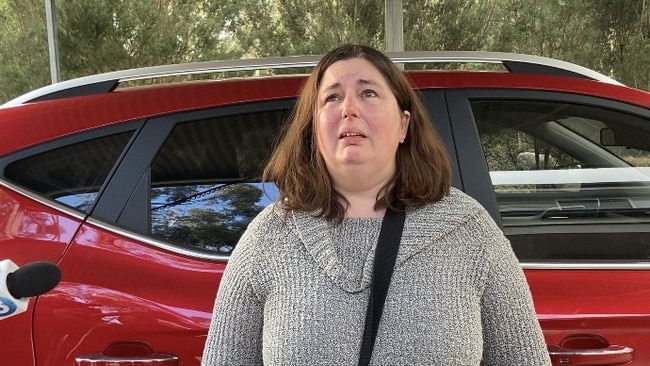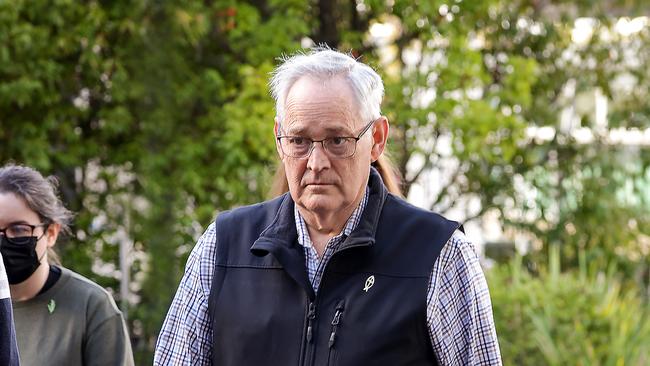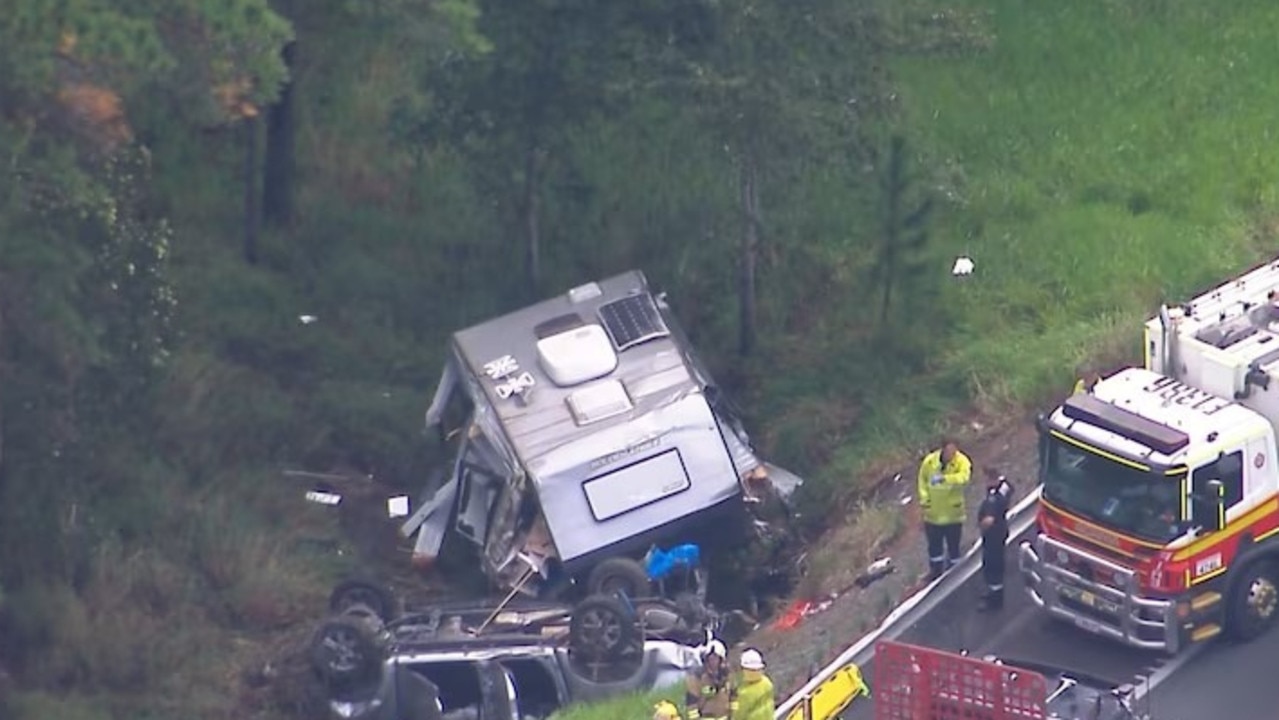Erin Patterson trial: Death cap mushroom toxins found in beef Wellington leftovers, jury told
The bombshell comes after the judge received a tip-off about the juror.

News
Don't miss out on the headlines from News. Followed categories will be added to My News.
A juror has been discharged from Erin Patterson’s triple-murder trial.
Ms Patterson, 50, is facing trial after pleading not guilty to the murder of three of her estranged husband’s relatives and attempting to kill one more on July 29, 2023.
Prosecutors alleged she deliberately spiked a beef wellington lunch with death cap mushrooms, while Ms Patterson’s defence say it was unintentional and a “tragic accident”.
About 11am on Thursday morning, Justice Christopher Beale brought the remaining 14 members into the courtroom as he told them one of their numbers had been discharged.
The judge told jurors he’d received information the juror had discussed the case with friends and family contrary to directions given to jurors at the start of the trial.

He said he formed the view the information was “credible”, but did not make a positive finding that the juror did discuss the case, only that there was a reasonable possibility it occured.
“I remind you to only discuss the case with your fellow jurors, not anyone else,” he said.
“On that unhappy note, we’re now ready to resume the trial.”
Toxin claim in mushroom murder trial
Called to give evidence on Thursday afternoon, head of forensic sciences and chief toxicologist at Victorian Institute of Forensic Medicine Dimitri Gerostamoulos told the jury alpha-amanitin and beta-amanitin toxins were detected in the leftovers.
Dr Gerostamoulos said the Victorian Institute of Forensic Medicine tested meat, pastry and mushroom paste samples from beef Wellington located in Ms Patterson’s bin after the lunch.
In three of four mushroom paste samples no alpha-amanitin or beta-amanitin toxins were found, but in one sample they detected beta-amanitin.
Beta-amanitin toxins were also detected in one meat sample, he said.
In samples supplied of “vegetable matter” located in a dehydrator, Dr Gerostamoulos said both alpha-amanitin and beta-amanitin toxins were detected.
Questioned by Justice Christopher Beale those toxins were “exclusively” found in death cap mushrooms, Dr Gerostamoulos responded; “yes”.
Dr Gerostamoulos will face cross-examination when the trial resumes on Friday morning.
‘Nice flavour’: Mushroom cook’s alleged claim
On Thursday morning, child protection worker Katrina Cripps was called to give evidence, telling the jury she interviewed Ms Patterson on August 1 while she was still in hospital.
The following day, Ms Cripps said she visited Ms Patterson’s home about 1pm after she had been discharged from Monash Medical Centre.
Ms Cripps was questioned about what Ms Patterson told her about the mushrooms used in the beef wellington lunch.
She told the jury that Ms Patterson said she used fresh mushrooms from Woolworths and dried mushrooms purchased from an Asian grocer.
“She said she read the ones she got from the Asian grocer would add a nice flavour,” Ms Cripps said.
“She said she found the recipe in a cookbook and wanted to do something new and special.”

Ms Cripps said Ms Patterson described rehydrating the dried mushrooms, chopping them up and mixing them with the fresh mushrooms.
Ms Patterson described the mushrooms as coming in a bag that was not resealable and had a white label, Ms Cripps said.
She told the court that Ms Patterson claimed she had previously opened the packet, planning to use the mushrooms a few months earlier but decided not to and stored them in a tupperware container.
“She was going to use them in a carbonara but they had a very strong smell,” Ms Cripps said she was told.
Of the lunch, Ms Cripps said Ms Patterson told her the guests chose their own plates, with the accused woman taking “the one that was left” and saving two plates for her children.
She said she was told Ian and Heather Wilkinson ate a full serve, Don Patterson ate his serve and half of his wife Gail’s, while Ms Patterson ate a half portion.
Later, Ms Cripps confirmed Ms Patterson had told her she consumed “half” her beef wellington.
‘Nasty’: Alleged poisoner’s claim to worker
Ms Cripps said Ms Patterson told her after she applied for child support around September 2022, the separated couple’s relationship changed and Simon Patterson “became nasty”.
“She talked about feeling he was at time controlling and emotionally abusive … would say things that made her doubt herself as a mother,” she said.
“But she did say they had a good relationship until recently.”

She told the jury Ms Patterson said Simon’s parents, Don and Gail Patterson were “like the parents she never had”, but their relationship too had changed.
“She felt he was isolating her from the family,” he said.
Ms Cripps said Ms Patterson told her she did not have a support network outside of her husband’s family and “became upset” at the prospect of losing this following the lunch.
Alleged poisoner claimed she fell sick
Ms Cripps told the court Ms Patterson said she started to feel unwell the evening following the lunch, with “loose bowel movements”.
She said the accused woman told her she dropped her son’s friend home and stopped at a supermarket on the way home but remained in the car hoping the seat would “act as a cork”.
Ms Cripps was questioned by Justice Christopher Beale whether “cork” was Ms Patterson’s word, responding “yes”.
Forensic scientist called to give evidence
Head of forensic sciences and chief toxicologist at Victorian Institute of Forensic Medicine Dimitri Gerostamoulos gave evidence that death cap mushrooms primarily contained three toxins, called alpha-amanitin, beta-amanitin and gamma-amanitin.
“They’re quite toxic in terms of the potency,” he said.
“They progressively get worse, if the toxin isn’t removed they progress to tissue necrosis, organ failure and can lead to death.”
Dr Gerostamoulos said when introduced into the human body the toxins stopped normal cell function and affected the liver and kidneys.
He told the court the toxins were “quite resilient” and remained stable when subject to high heat, such as when cooked.
If the toxins were ingested, Dr Gerostamoulos said the liver was unable to process them.
“They are rapidly cleared, usually within a day from the blood, but may remain in the urine for some days,” he said.
“It’s essential a sample is taken close to the time of ingestion.”

Toxins found in two lunch guests, not others: expert
Dr Gerostamoulos was taken through a series of tables outlining the results of toxicological assessments of samples taken from each of the lunch guests.
The court was told both alpha-amanitin and beta-amanitin toxins were detected in Don Patterson’s urine sample taken in hospital the morning of July 30.
Dr Gerostamoulos said those toxins were not found in any other sample taken from Don before or after his death on August 5.
Taken to Gail Patterson’s results, Dr Gerostamoulos said neither of the toxins were detected.
But he said no urine sample was provided from the hospital taken prior to her death.
“There was no alpha-amanitin and beta-amanitin detected in any of those samples,” he said.
Dr Gerostamoulos said neither of the toxins were detected in samples taken from Heather Wilkinson, but beta-amanitin was detected in a serum sample from Ian Wilkinson taken on July 30.
The toxicologist said samples were taken from Erin Patterson and her two children in the afternoon of July 31, with the toxins not detected in each.
Alleged mushroom poisoner was ill: doctor
Called to give evidence at the trial on Wednesday, intensive care specialist and Flinders University professor Andrew Bersten said Ms Patterson’s medical records were “consistent” with her having suffered a diarrhoeal illness.
The jury was told Ms Patterson checked herself into Leongatha Hospital on July 31, complaining of abdominal cramps, nausea and diarrhoea since the evening of the lunch.

Later the same day she was transferred to Monash Medical Centre in Melbourne where she spent 21½ hours before being discharged.
Dr Bersten confirmed the notes indicated that she was discharged on August 1 with no evidence of poisoning from death cap mushrooms or any other toxic substance.
Three of her in-laws, Don and Gail Patterson and Gail’s sister Heather Wilkinson died within a day of each other in early August from multiple organ failure due to clinically diagnosed amanita mushroom poisoning.

Heather’s husband Ian Wilkinson gradually recovered and he was discharged into the rehabilitation ward on September 11.
At the start of the trial Ms Patterson’s barrister, Colin Mandy SC, told the jury that his client did not dispute her guests were poisoned with death cap mushrooms but that she did not deliberately poison anyone.
“The defence case is that she didn’t intend to cause anyone any harm on that day,” he said.
“The defence case is that what happened was a tragedy and a terrible accident.”
The trial continues.
Originally published as Erin Patterson trial: Death cap mushroom toxins found in beef Wellington leftovers, jury told



